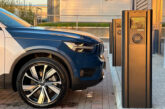
Electric vehicles could be the largest contributor to flexible capacity in our electricity grid, according to recent data captured by myenergi, the UK’s largest provider of eco-smart home technology.
In recent months, myenergi, which manufactures a range of smart home energy products – including the zappi solar EV charger – has supported UK grid events with thousands of customers signed up to offer flexible capacity.
With more than 13MW of aggregated flexible capacity in total – equivalent to the average power consumption of c.40,000 homes – myenergi has been sending commands to zappi chargers that have responded to grid events by reducing their consumption by an average of 2.4kW per household. This offers far more flexible capacity than other demand side response (DSR) platforms, which have largely just seen consumers reduce home energy consumption by turning off lights and other appliances.
Lee Sutton, co-founder and CEO of myenergi, said: “Data we have collected from recent grid events prove that, far from being a hindrance on the electricity system, electric vehicles are ready to deliver huge benefits in terms of the flexible capacity when they shift charging demand to avoid grid constraints. While we recognise that consumer incentives will be a feature of the market, what is especially impressive is that we have been able to deliver this simply by asking customers to sign up to our DSR service.
“Done right, grid flexibility should not inconvenience consumers. Indeed, it’s clear that our customers have barely noticed these brief interruptions to their EV charging, as their vehicles have invariably still been able to finish charging.
“Demand side response is therefore about intelligent devices responding autonomously to remote commands. If it is to be successfully and widely – rather than grudgingly – adopted by consumers at scale, it really needs to be happening without the user even noticing. The industry should not be sending the message that the future of our energy system is contingent on everyone rushing around just before 5.30pm to switch off all their appliances and light some candles.”
Smart zappi EV chargers can be instructed to pause or reduce consumption – and in future, ‘turn up’ events are much more likely, where the grid will have a surplus of clean, renewable electricity and will request chargers switch on or increase their consumption to soak up this excess supply, rather than energy providers being forced to turn off this generation. While smart charging using the myenergi zappi will typically mean that EV drivers are charging outside of peak hours by default, myenergi has demonstrated the impact that eco-smart devices can have on delivering significant flexibility in energy capacity.
More information about the zappi solar EV charger and an installation quote tool can be found here








